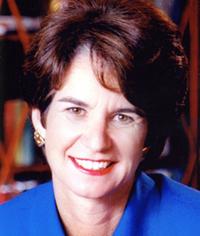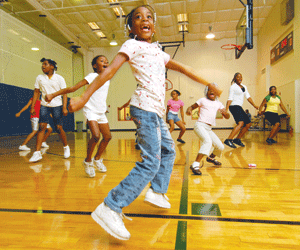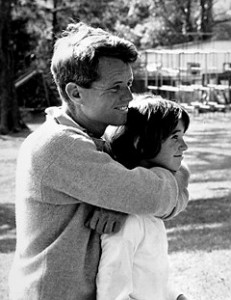By Jonathan Miller, on Mon Jun 6, 2011 at 8:30 AM ET Yesterday, June 5, marked the 43rd anniversary of the tragic assassination of Senator Robert F. Kennedy.
His daughter, our very own contributing RP, Kathleen Kennedy Townsend, spent the weekend paying tribute to the virtue of public service. In a speech before the The Women’s Network, Townsend shared her thoughts on the meaning of her father’s legacy:
In 1968, as you all remember, my father was running for president. David Frost asked Ronald Reagan and my father a question. I’m going to ask you that same question and give you thirty seconds of silence to think about how you’d answer that question, okay? The question is, “What is the purpose of life?” Think about how you would have answered it, okay?
Both Ronald Reagan and my father came up with good answers, and answers that rooted in the American tradition. Ronald Reagan said “The first thing is you have to reproduce yourself. Of course my mother [of ten] did a really good job on that one. And then he said what we really need in this country is individual freedom. We’re based on a belief in the Judeo-Christian belief of individual salvation and so what we need is individual freedom within the extent of the law. That was his answer. That makes a certain amount of sense. We talk about freedoms, we’re clelebrating Franklin Roosevelt’s four freedoms.
But I think Ronald Reagan missed something. My father said the first thing you do, you need enough food, clothing and shelter. If you don’t have that, that’s not a worthwhile life. But after you do that, you have to help others. You may have no shoes, but there’s always somebody else who has no feet. Our responsibility is to help others.
What had happened in 1968 when my father lost the election is we moved away from a sense that we’re all in this together, we’re part of a larger community, and we have to help one another. [We moved to] A belief only in ourselves, individualism. That started to dominate our economic system, which wasn’t there before. Milton Friedman, Allen Greenspan, who only thought: “What can we do for me?” Ayn Rand. And that has been a destructive economic system. We hear the rhetoric: “We want to cut taxes to create wealth”. Well, wealth for whom? Wealth for the top two percent of Americans. Wealth for the rest of Americans has not gone up in thirty years. What we’ve done is focused on wealth and not on worth. It means our country is weaker of this bad ideology which we have to change, and that’s what Democrats need to do.
For the entire speech, transcribed by Blue Bluegrass blogger Bob Layton, click here.
– – –
Coincidentally (?) , Townsend entered the patheon of the American intellectual zeitgeist yesterday as well. She was featured as a clue in the New York Times Sunday crossword puzzle:
106 Down: “Kathleen Kennedy Townsend, to J.F.K.” Five letters.
I didn’t say it was a remarkably difficult clue…
By Kathleen Kennedy Townsend, on Wed Jun 1, 2011 at 8:30 AM ET Elementary education thrives in the middle of an Orlando YMCA
 I was in Orlando a few weeks ago, but not at Disney World or the Epcot Center. My youngest is 19, so it’s been a while since I stayed at the African lodge and watched the giraffes come up to our window. Even further back is my memory of “It’s a Small World After All” at the New York’s World’s Fair in 1964, a place I visited quite often as a 12-year-old when my father was running for the Senate. Fast forward almost half a century and my second daughter is pregnant, so I hope I’ll be back to Disney World again before too long. I was in Orlando a few weeks ago, but not at Disney World or the Epcot Center. My youngest is 19, so it’s been a while since I stayed at the African lodge and watched the giraffes come up to our window. Even further back is my memory of “It’s a Small World After All” at the New York’s World’s Fair in 1964, a place I visited quite often as a 12-year-old when my father was running for the Senate. Fast forward almost half a century and my second daughter is pregnant, so I hope I’ll be back to Disney World again before too long.
Actually my destination a few weeks ago was just as exciting as the Big Mountain Thunder Railroad or Buzz Lightyear’s Space Ranger Spin. It was a school of the future, already up and running: the Lake Nona YMCA/NorthLake Park Community-School Partnership.
 NorthLake Park public elementary school is located in the same building as the local YMCA. Wow! The 30,000-square-foot Y is literally right in the middle of the school. The children, who would never have had access to a swimming pool at any regular public school, can now learn to swim, and they also get in shape in the gym and on the walking trails. Some of them take yoga before a test to reduce their pre-test butterflies. NorthLake Park public elementary school is located in the same building as the local YMCA. Wow! The 30,000-square-foot Y is literally right in the middle of the school. The children, who would never have had access to a swimming pool at any regular public school, can now learn to swim, and they also get in shape in the gym and on the walking trails. Some of them take yoga before a test to reduce their pre-test butterflies.
Teachers, too, can easily get to the gym’s StairMasters, weights, and workout classes. The results aren’t just better abs but better attitudes. The teachers are happy, and their higher retention rate pays dividends for the kids.
The parents are also more involved. Instead of an awkward once-a-year meeting, teachers and parents find themselves on adjacent bikes in the spin class. They’re comfortable with one another.
I was stunned to learn that the school was more than a decade old, because it looked so new and fresh. A few years ago, when the school system didn’t have the money to paint the building, they turned to their partner. The Y raised the money and the painters came.
The school and the Y were originally built in 2000, the result of an innovative partnership that included Orange County Public Schools, the Central Florida YMCA, and other private- and public-sector partners.
I admired this partnership because I had led efforts to connect schools and communities in Maryland for almost 20 years. If the community feels the school is theirs, the parents are more apt to visit, volunteer, and talk to teachers. The schools can only benefit from neighbors who care — fewer fights, better test scores, healthier students. Nationally, the group Communities in Schools, launched by the visionary reformer Bill Milliken, has done a terrific job of attracting community support for schools and promoting the ideas that all children should have mentors, do community service, and have great health care.
But what I saw in Orlando was unique, a local initiative that’s the first of its kind in the nation. Here the community is represented by the YMCA, an already vigorous and attractive institution. This means that the school doesn’t have to do all the hard work. It has a built-in magnet.
As I walked along the halls and visited the classrooms, I kept imagining what could be accomplished if we replicated this model in the 2,500 YMCAs across the country. The Ys already flourish, because they have enticing facilities that people are eager to come to. It would be amazing if each Y could be paired with a school.
Read the rest of…
Kathleen Kennedy Townsend: The School of the Future, Up and Running
By Kathleen Kennedy Townsend, on Tue May 24, 2011 at 8:30 AM ET  Among her many civic and philanthropic roles, contributing RP Kathleen Kennedy Townsend sevres as Chair of the University of Maryland School of Medicine’s Institute of Human Virology, founded by well-known AIDS researcher Dr. Robert C. Gallo. In recent weeks, the Institute received $23 million in new funding for an HIV/AIDS vaccine from the Bill and Melinda Gates Foundation, the U.S. Army, and other organizations. Among her many civic and philanthropic roles, contributing RP Kathleen Kennedy Townsend sevres as Chair of the University of Maryland School of Medicine’s Institute of Human Virology, founded by well-known AIDS researcher Dr. Robert C. Gallo. In recent weeks, the Institute received $23 million in new funding for an HIV/AIDS vaccine from the Bill and Melinda Gates Foundation, the U.S. Army, and other organizations.
Still, Townsend argues, the need for research dollars is far, far greater. As she wrote for Atlantic magazine online:
While researchers are still struggling to develop a preventive vaccine, the treatment of HIV/AIDS has drastically changed. For most of the developed world, HIV/AIDS has been transformed from a death sentence to a chronic disease.
Unfortunately, this isn’t the case in the developing world, particularly in sub-Saharan Africa, where millions don’t have access to life-saving drugs. For them the death sentence has not been commuted.
Read the rest of Townsend’s essay here.
By Kathleen Kennedy Townsend, on Wed Apr 20, 2011 at 8:30 AM ET 
I want to thank Jonathan Miller for giving me the chance…as a recovering politician…to contemplate this week on the relation between faith and politics.
After my eight years as Lt. Governor of Maryland, I wrote “Failing America’s Faithful: How Today’s Churches are Mixing God with Politics and Losing Their Way.” I thought that many churches that had once served as a counterweight to a nation overly obsessed with money were no longer were fulfilling this critical function.
Religious communities were strong and vocal during the Civil Rights era, and in the protests against the Vietnam war, following a strong tradition which began in the First and Second Great Awakenings, during which ministers preached to thousands (and this was the time before microphones!!) demanding justice.
The Abolitionist movement and the Suffragette movement both grew out of the Second Great Awakening. The late 19th century was the time of the Social Gospel activists, who asked “What would Jesus do?” as a way to urge the end of child labor, and to promote safe working conditions, a strong union movement and fairness for prisoners. FDR compared the New Deal to the “Sermon on the Mount” enacted into law. In the thirties and forties, Jesuits ran over 300 labor organizing schools.
This Holy Week — Passover, Good Friday and Easter — is the perfect time to reflect on our lives. What have we done? What should we be doing? Questions of justice and fairness permeate our conversations.
As an added bonus, this spiritual moment coincides with the fierce debates about the budget. We can and should engage in examination of conscience and examination of country. My fear is that the religious communities will not play the vigorous role in this debate as they have in our past.
Unfortunately today, may churches seem to have shrunk God, so that rather than a Deity who cares for the whole nation, this God is concerned with only “me”. They ask: “What is my relationship to God?” not “What is my duty to be concerned with all God’s children?” God seems to be created in the image of the believer, not a large God who is concerned with everyone.
 Kathleen and her dad. Click on the picture to watch a video on RFK's South Africa trip. When my father, Robert Kennedy, returned from South Africa, he wrote an article for Look magazine entitled, “Suppose God is Black?” He knew that God cared about justice for all, not just the few. He knew that Christ had said it was easier for a camel to get through the eye of the needle than for a rich man to enter heaven.
Today, America seems to celebrate the rich and famous. We tax work at higher levels that we tax wealth. There are some wonderful leaders such as Jim Wallis of Sojourners and groups that are concerned with the Common Good, with the proper relation between faith and politics.
I hope that we use this time to use our religious teachings to inform questions of public policy. And, of course, I am interested in any response to these ideas.
|
|








Follow Kathleen: